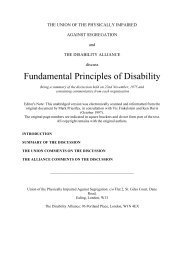Global-Report-Living-Colour-dr2-2
Global-Report-Living-Colour-dr2-2
Global-Report-Living-Colour-dr2-2
Create successful ePaper yourself
Turn your PDF publications into a flip-book with our unique Google optimized e-Paper software.
Inclusive Communities = Stronger Communities<br />
GLOBAL REPORT ON ARTICLE 19: THE RIGHT TO LIVE AND BE INCLUDED IN THE COMMUNITY<br />
41<br />
different expectations in different cultures about the<br />
extent to which individuals are “free” to make their<br />
own choices or instead bound by what the<br />
community deems appropriate for their social status.<br />
‰ The strength of civil society<br />
Overlapping with these issues of family structure and<br />
culture is the nature of community and the forms of<br />
voluntary organisation which societies encourage. In<br />
some high income countries, traditional social capital<br />
(e.g. in extended family structures) is<br />
weak but there are many ways in which<br />
citizens can come together voluntarily<br />
for mutual aid and to advance their<br />
interests, as indeed we see in some of<br />
the family associations which<br />
constitute our movement. In other<br />
developed countries such as the<br />
former Soviet bloc, non-governmental<br />
organisations (NGOs) are both a recent<br />
and a relatively fragile network for<br />
supporting people with intellectual<br />
disabilities and their families. In other<br />
societies such as in Africa and Asia,<br />
there is very strong social capital but it<br />
is based on traditional clan and local authority<br />
structures. Choices and control for many people in<br />
those cultures are dictated by the clan or tribe.<br />
‰ Economic development and social inequality<br />
Beyond these social connections there are of course<br />
also massive global inequalities in the extent of<br />
economic development and the distribution of<br />
access to the world’s material resources. Within<br />
countries too there can be huge disparities in wealth<br />
(including between urban and rural areas) and<br />
therefore in the resources available for action, e.g. to<br />
fund support for people with disabilities and their<br />
families. Indeed the absolute poverty experienced by



